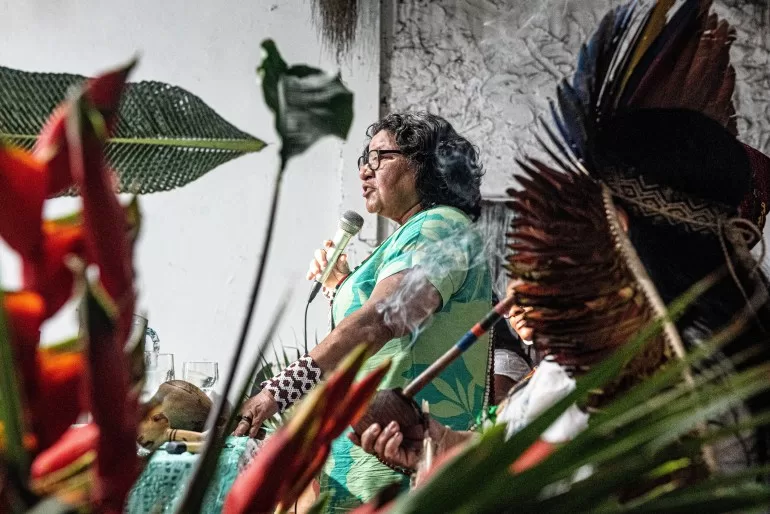Maria de Fátima Muniz, 52, was a spiritual leader among the Pataxó Hã-Hã-Hãe, an Indigenous group in northeastern Brazil. A short, serious woman with dark, shoulder-length hair, she was known to lead her people in prayer and song, her voice deep and steady.
But on January 21, that voice could not quell the violence about to erupt in the rolling green hills outside Potiraguá, a town in the state of Bahia.
About 50 members of Maria’s village had gathered there to set up camp one day prior, in an effort to reclaim part of their ancestral homeland. She, her brother Chief Nailton Muniz and the other Pataxó Hã-Hã-Hãe activists had planned to plant traditional crops in the area: beans, cassava and corn, alongside medicinal herbs.
But their presence generated backlash among the local landowners. A social media message soon circulated on WhatsApp, calling on merchants, farmers and landholders to “take back” the parcel.
More than 30 vehicles arrived the next morning, blocking access to the roads. The Brazilian government later estimated there were 200 non-Indigenous “ruralists” present. Some came armed.
Mukuna said police on the scene had assured the Pataxó Hã-Hã-Hãe of their safety. Video showed the group chanting at the top of a dirt path, while officers stood metres away.
Law enforcement did nothing, however, as the ruralists raised their guns to shoot, Chief Muniz and his stepson Mukunã allege.
The ruralists opened fire and attacked the group, wounding at least five people and setting fire to Pataxó Hã-Hã-Hãe vehicles. Chief Muniz was shot in the kidney. And his sister was fatally injured. She died on the way to the hospital.
“The police were watching everything,” said Mukunã, “as if we were nothing to them.”
Maria became the second Pataxó Hã-Hã-Hãe leader to be shot dead in southern Bahia in the past three months.
Her death has raised lingering questions about the ongoing violence against the Pataxó Hã-Hã-Hãe community — and whether Brazilian President Luiz Inacio Lula da Silva can follow through with his promises to defend Indigenous rights.

A cut-off date for Indigenous land claims
Lula himself responded to the shooting by pledging federal support to “resolve this situation”.
“I want to make the federal government available to help Indigenous peoples find a solution so that we can resolve this peacefully,” he told Radio Metropole after the attack.
Lula has publicly sought to expand protections for Brazil’s Indigenous groups, a population of nearly 1.7 million people. Last April, four months into his term, he announced the creation of six new federally recognised Indigenous territories — the first such recognition in years.
“We are going to legalise Indigenous lands,” he said in an accompanying address. “I won’t leave a single Indigenous territory unprotected.”
The number of land demarcations was lower than expected, however, falling short of the 14 territories his government had pledged to recognise — one of which was Pataxó territory in the south of Bahia.
Critics say the president has also failed to defend Indigenous groups from an onslaught of recent court cases and legislation, designed to weaken their claims over their ancestral lands.
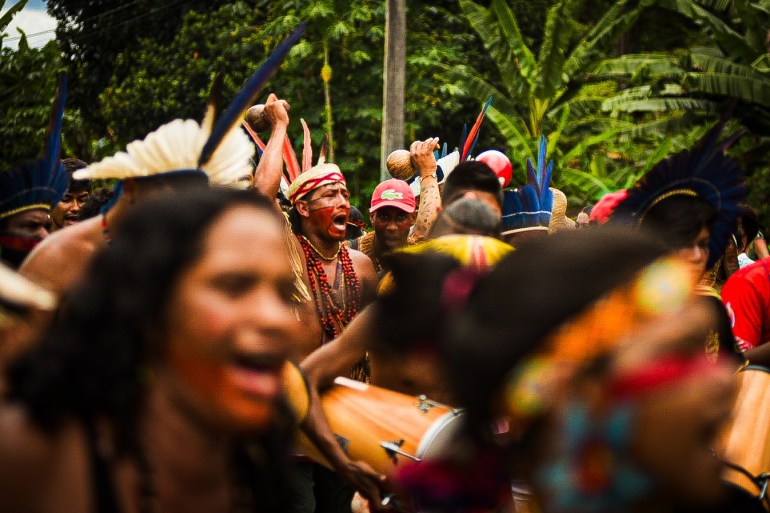
One of the most recent efforts has been to implement a “marco temporal” or “time marker” to cut off Indigenous land claims.
Any land they did not inhabit on October 5, 1988 — the date of Brazil’s most recent constitution — would not be recognised as Indigenous territory under the policy.
Advocacy groups have blasted the policy as a dangerous rollback of Indigenous rights, one that ignores the legacy of displacement many tribes have endured.
A United Nations human rights expert warned the legislation could “legitimize violence against indigenous peoples”, and the Climate Observatory, a Brazil-based advocacy network, nicknamed it the “Indigenous genocide law”.
But the “marco temporal” enjoys strong support from Brazil’s agricultural lobby, which seeks access to natural resources on Indigenous lands.
The lobby is powerful, and its reach extends to Brazil’s Congress. A majority of lawmakers in both congressional chambers identify as part of the “Bancada Ruralista”, a voting bloc that advocates for farming interests.
That broad base of support allowed Congress to ultimately pass the “marco temporal” in December, sidestepping a Supreme Court decision that previously declared the policy unconstitutional — and even overriding a partial veto from Lula himself.
Joelson Ferreira — who works with Chief Muniz as co-founder of Teia dos Povos, a national alliance of Black, Indigenous and working-class Brazilians — believes that part of the blame for the bill’s passage lies with leftist leaders.
Ferreira accused them of making too many concessions to the agricultural lobby. “The left likes to negotiate with agribusiness to keep itself in power,” he said.
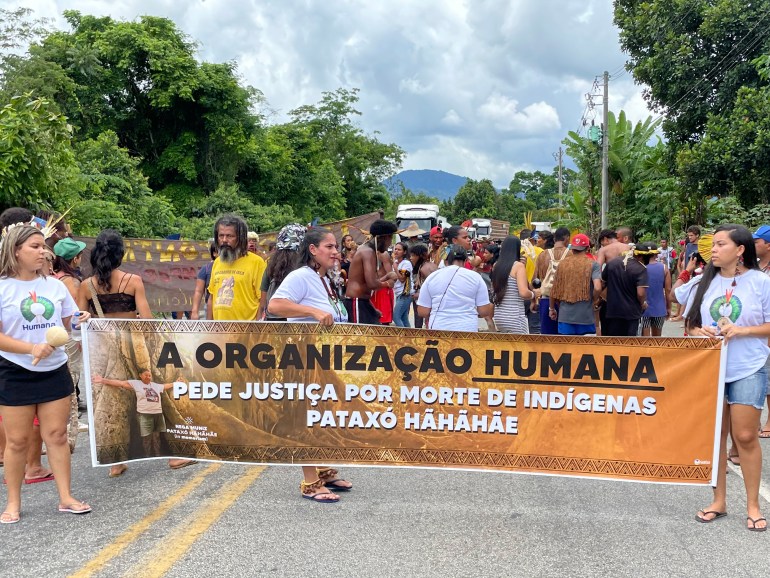
A ‘militia’ to fight for farmers’ rights
For Ferreira, there is a direct line between Maria’s death and the lobby’s sway in Congress.
The ranchers accused of shooting Maria were allegedly part of an armed militia called Invasion Zero, founded in April last year by Luiz Uaquim, a politician and landowner in southern Bahia.
Invasion Zero boasts ties with other conservative legislators in Brazil’s Congress. An eponymous legislative coalition was formed in October to promote legislation like the “marco temporal” and counter Indigenous land claims.
“If you mess with these militias, you mess with agribusiness,” Ferreira said.
In response to Al Jazeera’s request for comment, Invasion Zero denied responsibility for Maria’s death.
In a public statement, Invasion Zero also said it “deeply laments the confrontation” and “has never incentivised acts of violence”, instead prioritising the “peaceful resolution of land disputes”.
According to an interview Uaquim gave Al Jazeera, there is “no connection between this movement and the death of the Indigenous woman. There are farmers all over Brazil, and each is responsible for what he does.”
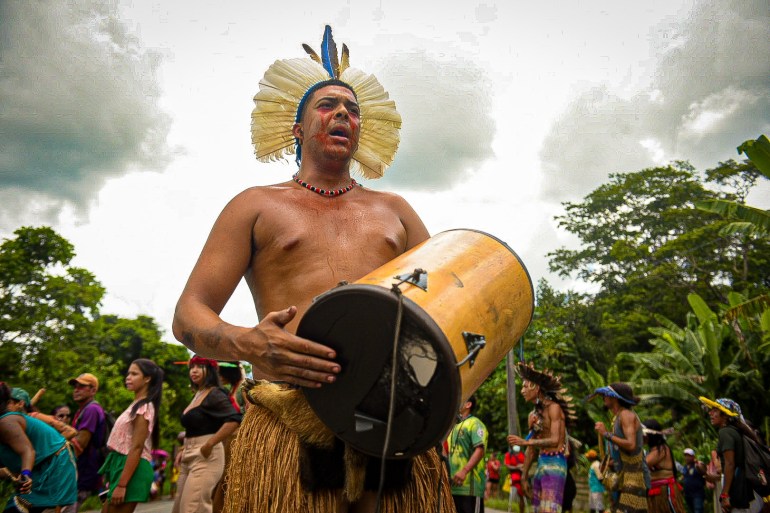
Two people — the son of a rancher and a retired police officer — were ultimately arrested as suspects in Maria’s death. Police have confirmed that the bullet that killed Maria came from the gun of the rancher’s son.
The Bahia military police told Al Jazeera that, in addition to arresting the two suspects, it has opened investigations into the actions of its police officers.
Invasion Zero considers itself a “movement of rural producers” that aims to mount a “firm defence of private property”. Its existence, however, reflects the ongoing conflict between Brazil’s Indigenous peoples and the businesses that seek to expand into their ancestral lands.
The government considers about 13 percent of Brazil to be Indigenous territory, a designation that protects the land from outside development. Much of that territory overlaps with the Amazon rainforest, a key ecosystem in the fight against climate change.
Yet Indigenous territory is not the only point of struggle for land reform activists, who point to an eye-popping statistic: Land distribution in Brazil is among the most unequal in the world, with one percent of landowners owning nearly half of all land in the country.
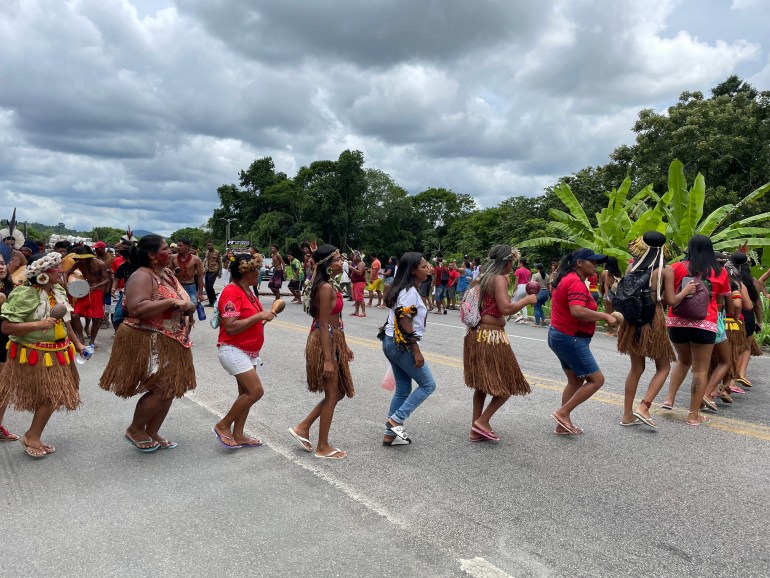
Occupying the land to force change
The ranch land at the centre of January’s violence was part of the territory the Pataxo Ha-Ha-Hae say was awarded to them in a 2012 Supreme Court decision.
That ruling nullified nearly 200 private titles in Bahia, transferring ownership of the land back to the Pataxó Hã-Hã-Hãe — at least, in theory. Indigenous activists say instead that the process has stalled, leaving their land in the hands of farmers.
Chief Muniz and Mukunã told Al Jazeera that camps like the one set up at the ranch in January provide a means of reclaiming the territory. The Pataxó Hã-Hã-Hãe were some of the first Indigenous people to encounter Portuguese colonists and have since suffered centuries of displacement.
“This occupation is really a question of honouring our ancestors,” said Mukunã. “Of honouring those who have fought and spilled blood on this territory.”
His stepfather explained that, since 1982, their village has succeeded in retaking 54,000 hectares (about 133,400 acres) of land, although 100,000 hectares (about 247,100 acres) remain in the hands of private ranchers.
“Over time, our land has been reduced and reduced,” said Chief Muniz. He believes the occupations will eventually force the Brazilian government to conduct a study proving that this land belongs to Indigenous people.
The Pataxó Hã-Hã-Hãe are not the only group to deploy this tactic. The Marxist-inspired Landless Workers Movement (MST) — considered by some to be the largest social movement in South America — has used the occupation and cultivation of unused land to push for social reform.
Supporters of the Pataxó Hã-Hã-Hãe, like Ferreira, are longtime members of the group. MST families also blocked highways in protest after Maria’s death.
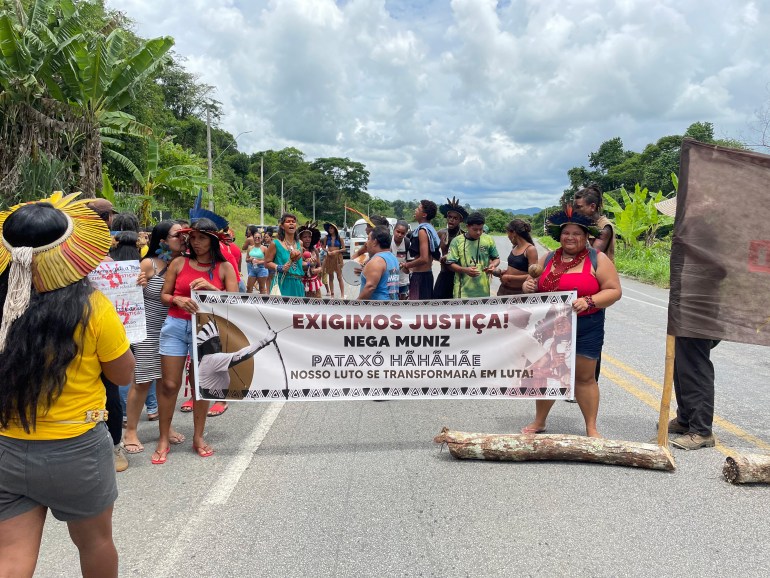
Indigenous activists facing violence
But Indigenous activism to reclaim land — or protect existing territory — has prompted a violent backlash.
The advocacy group Global Witness estimates at least 1,910 “land and environmental defenders” have been killed worldwide between 2012 and 2022, many of them Indigenous. In Brazil, 34 “defenders” lost their lives in 2022 alone.
The Pataxó Hã-Hã-Hãe have experienced this spate of violence firsthand. In December, just weeks before Maria was shot, another Pataxó Hã-Hã-Hãe leader was gunned down: 31-year-old Lucas Santos de Oliveira. According to media reports, his assailants were two men on a motorcycle.
In addition to reclaiming ancestral territory, Mukunã believes land occupation is also a tool to protect the environment. He points out that, under Pataxó Hã-Hã-Hãe’s care, forests have grown back in Bahia.
The United Nations has also noted that Indigenous stewardship corresponds with lower rates of deforestation in general. A 2021 report examining multiple countries found that “intact forest” declined by only 4.9 percent in Indigenous areas, compared with 11.2 percent elsewhere.
Mukunã explained that protecting the environment can have tangible benefits for the Pataxó Hã-Hã-Hãe, too. “It’s to have a better quality of life,” he said. “We need a forest to hunt in, a river to fish in.”
His stepfather told Al Jazeera he hopes Maria’s death can push the government to take action — to demarcate and protect Indigenous land to avoid further bloodshed.
They remember Maria as a wise figure, extremely active in her community, who organised cultural exchanges and represented the Pataxó Hã-Hã-Hãe at political events. She participated in midwifery and hosted prayer sessions in her home.
“She’s always going to be present with us,” said Mukunã. “In our rituals, in our songs, in the closing of our eyes, in the smoke that rises from our pipe, in the blowing of the wind. She has become a legend for our people.”
“It’s a privilege accorded to few to die the way she did: fighting for what was hers.”
